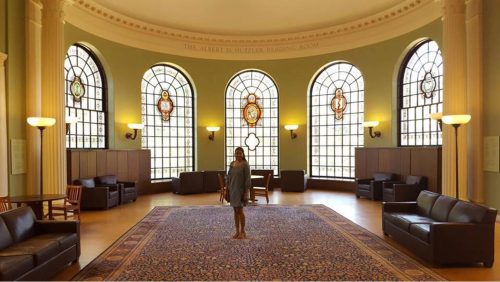
Damini Agarwal Alumni Spotlight
By: Ira Pundeer
Alumnus of: Whiting School of Engineering
How did your journey at Hopkins shape your career in biomedical technology? Any specific experiences or lessons that stand out?
My biggest learning from my Hopkins journey, was to not be afraid of the unknown. As a young researcher, one naturally gravitates towards trying to solve problems that we already know answers to. However, my Hopkins education challenged me to have confidence in my abilities and to use them to push the boundaries of science. This has led to a rich career in research and development of bionic arms, where we redefine the unknown each day!
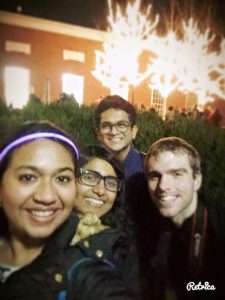 Reflecting on your time at Hopkins, is there a memorable incident or experience that you’d like to share?
Reflecting on your time at Hopkins, is there a memorable incident or experience that you’d like to share?
I think my favourite memory at Hopkins was the Lighting of the Quad ceremony, which to date remains my most favourite Hopkins tradition. It’s so festive, the whole Homewood community gets together for a fun winter carnival, President Daniel’s speech has the annual trivia questions and then a spectacular fireworks show lights up the sky. It is truly magical and I make sure to attend even today, if I am in Baltimore during that time. The photo is from the first one that I attended at Hopkins!
How would you define your current work at IBT?
We build the brains of bionic arms! Our technology is #innovative, makes individuals with limb loss #independent through #simpler and #smarter systems.
We know you’re actively contributing to building a wider Hopkins community at Whiting School of Engineering. Can you share a bit about your involvement and any exciting initiatives you’re part of?
Absolutely! As an alum, it gives me great joy to give back to the school and I do so by serving on the JHU WSE Alumni Leadership Committee. As part of that leadership group, I have been working with the Dr. Sridevi Sarma, Vice Dean of Graduate Education at the Whiting School of Engineering to support programming for students in India to help them learn more about Whiting School of Engineering and to also create pathways for students to pursue graduate education at JHU WSE. One such program that was inaugurated last year by the school and is being conducted for the second time in Summer 2024, is HEEP or the Hopkins Engineering Exploratory Program. It allows students from international partner institutions of JHU to apply and competitively be selected for a one week funded immersion program on the Homewood campus. Students attend a series of engineering and STEM workshops/short courses with leading Hopkins faculty, go on tours of the JHU campuses, labs, trips to tourist and historical locations, as well as attend workshops and panels about graduate school and careers in engineering. It is a great way to experience the Hopkins culture and build relationships with students, faculty and staff. Learn more here: https://engineering.jhu.edu/admissions/graduate-admissions/heep/
In addition to supporting WSE initiatives in India, I am also working with the WSE and GKII teams to create more alumni programming for alums that are from India, currently in India or belong to the Indian diaspora. Through our programming efforts, we hope to build strong connections with all our Indian affiliated alums to deepen the relationship between Johns Hopkins and India. The GKII team recently sent out short online survey for all our India affiliated alums, please do fill it out if you have not had a chance to do so!
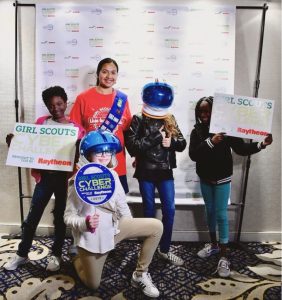 You’re clearly passionate about your work, but can you share any other area/cause that ignite your passion outside of the professional realm?
You’re clearly passionate about your work, but can you share any other area/cause that ignite your passion outside of the professional realm?
Outside of work, I am very passionate about introducing young girls to STEM fields and mentoring women in STEM. I have been a Girl Guide and Girl Scout since 1999, first as a Rajya Puraskar Girl Guide in India and then as a Girl Scout Leader with Girl Scouts of Central Maryland and JHU Girls Scouts in the US. Through my Girl Scouts affiliation, we created a lot of STEM programming for young girls in Baltimore City Public Schools. More recently, I was selected as a Google Women Techmakers Ambassador in New Delhi, and through that, I actively mentor students on advanced technologies. I also serve as formal mentor for numerous Whiting School of Engineering mentorship programs and also serve as a Central Office Bearer for the VIT Alumni Association and it allows me to pay forward the mentorship that I received by helping grow the next generation of STEM leaders.
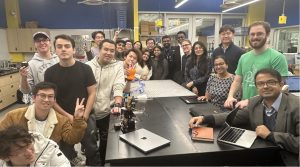 Favorite class at Hopkins? What made it stand out for you?
Favorite class at Hopkins? What made it stand out for you?
It would have to be the Principles of BME Instrumentation by Dr. Nitish Thakor! As someone that specialised in sensors and instrumentation, this class formed the very foundation of my core skillset. It was a thoroughly exhilarating and non-traditional learning experience that included building our own wearable medical device as well as assistive rehabilitation device and then using it to compete against other students in the class in a gaming challenge. We learnt how to draft a patent for our technology, to develop a business plan for it and several of us entered our projects into national design competitions and won accolades as well. The class truly challenged our abilities and taught us so much. My own undergraduate thesis project of a low cost ECG machine, which took me 3 months in my undergrad, was a 4 hour lab in this course! It was an extremely fast paced and hands on course, that I recently had the pleasure of going back and serving as a judge for.
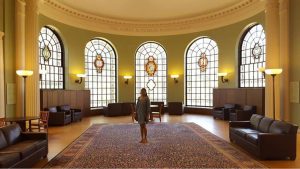 Every student has their go-to hangout spot on campus. What was yours, and what made it special?
Every student has their go-to hangout spot on campus. What was yours, and what made it special?
My favourite spot on campus is the Albert D Hutzler Reading Room in Gilman Hall. I chanced upon it quite accidentally, it was my first week navigating classes, it started raining heavily outside and I was looking for a place to do my homework in while I waited for the rain to subside and head towards Clark Hall (the BME building). I was in awe the minute I entered the room, the stained glass arched windows were magnificent provided so much grandeur to the room and it has been my favourite spot on campus since then.
A 2020 World Bank report highlights the underrepresentation of women in STEM fields despite India having the highest number of female STEM graduates globally. As a successful woman in STEM, what advice would you offer to aspiring women and girls pursuing STEM education? How can they navigate the challenges and pave their way successfully into the workforce?
My biggest advice would be to be your own strongest advocate. Self advocacy goes a long way in paving your own path, since no one knows what you need better than you! Additionally, something I have found incredibly helpful is to ask for help when you need it – it could be your childhood friends, peers, professors, senior folks at work and even reaching out to people on Linkedin that have had a path similar to one that you would like to pursue is super helpful for getting great advice and resources. Plus it helps you build a good network of likeminded people and you never know where the next opportunity might come from.